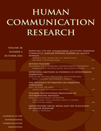-
Views
-
Cite
Cite
Werner Wirth, Matthias Hofer, Holger Schramm, Beyond Pleasure: Exploring the Eudaimonic Entertainment Experience, Human Communication Research, Volume 38, Issue 4, 1 October 2012, Pages 406–428, https://doi.org/10.1111/j.1468-2958.2012.01434.x
Close - Share Icon Share
Abstract
We examine the notion of eudaimonic entertainment during exposure to a sad but meaningful movie, using a new measure consisting of 5 dimensions derived from research on positive psychology. We, thereby, transfer the conception of eudaimonic well-being to the conception of entertainment. Results of a confirmatory factor analysis show that the 5 dimensions can be further condensed into 2 second-order factors. We applied these new measures in a study in which the ending of a movie was manipulated (sad vs. happy). The results provide both discriminant and convergent validity and show that hedonic entertainment measures were affected by the manipulation, but that eudaimonic entertainment measures were unaffected. A second study provided further evidence for the validity of the construct.





